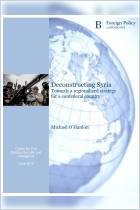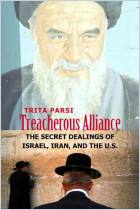
Inheriting Syria
Bashar's Trial by Fire
Recommendation
Despite somewhat dry writing and rapidly evolving events on the ground, this is a compelling book for anyone interested in the Middle East. Former U.S. State Department and C.I.A. Syria-expert Flynt Leverett covers the history, personalities and strategies of the late dictator, Hafiz Al-Asad, and his son, Bashar, Syria's current ruler. The author explains U.S. diplomatic options and traces the evolution of Syria, an impoverished "rogue" dictatorship long under U.S. sanctions as a state that supports terrorism. He devotes about 30% of his well-researched book to a chronology, appendix and footnotes. He provides extensive support materials to demonstrate why a country with so many internal needs has become such a devoted patron of terrorism, imbued with the purpose of destabilizing Western Democracies' policies and spoiling any regional peace efforts. Leverett also addresses the U.S. State Department's near tolerance of much of Syria's international troublemaking. While he presents clear descriptions, he offers no clear-cut answers - as if there are any - but offers possible scenarios, mostly stalemates, in this drawn-out international chess game. getAbstract.com recommends this book as important reading on U.S. foreign policy.
Summary
About the Author
Flynt Leverett, a senior fellow at the Saban Center for Middle East Policy at the Brookings Institution, was senior director for Middle East affairs at the U.S. National Security Council, senior Middle East analyst at the Central Intelligence Agency and a member of the policy planning staff at the U.S. State Department.
















Comment on this summary